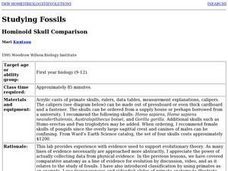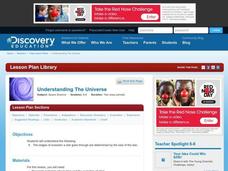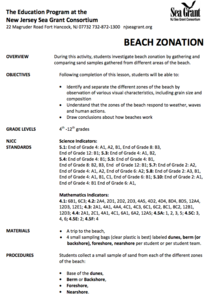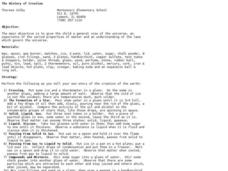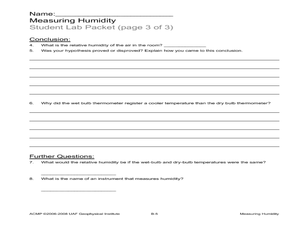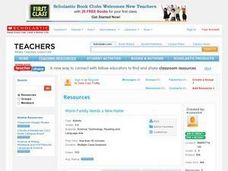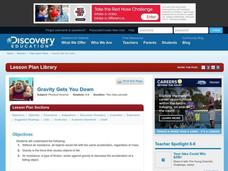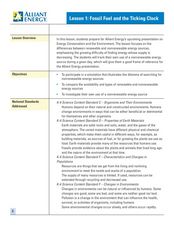Curated OER
How Many Birds Would It Take To Keep A Jackal Alive?
Students examine the role of large families in some animal populations. They work together to complete an activity related to food supply. They discover the relationship between preys and predators.
Curated OER
Taming Terrorism
High schoolers explore different organizations working to stop terrorism. They examine international summits and their recommendations. They participate in a debate about the effectiveness of the measures proposed.
Curated OER
Categorizing Celestial Objects
Learners work together to develop a classification system for planets. They take a class vote and read an article about an astronomer's classification system. They write an essay on how scientists make decisions for the general public.
Curated OER
Studying Fossils: Hominoid Skull Comparison
Students collect data on the differences in Hominid skulls using acrylic casts of fossil skulls. They measure a series of structures on skulls from six different species then use the data to determine evolutionary relationships between...
Curated OER
Water Reflections:
Students analyze data from monitoring activities . They summarize, post, and present the data from activities. They tell others in the community what they've learned about local water quality.
Curated OER
The Universe
Students recognize that the stages of evolution a star goes through are determined by the size of the star. They conduct research to draw a set of diagrams illustrating the stages in the evolution of three sizes of stars.
Curated OER
Beach Zonation
Young scholars investigate the characteristics of the beach environment and explore beach zonation. After gathering samples from different areas of the beach, students discuss how the beaches work and the characteristic of each zone....
Curated OER
The History of Creation
Students explore the properties of matter. In this lesson plan about matter, students will do a series of experiments to enable them to understand about creation of the universe. In these some of the experiments students will makes...
Curated OER
The Amazing Apple
Learners analyze an apple. In this instructional activity about developing inquiry skills, students do an experiment with an apple. Learners make several observations about the apple. Students answer questions to help them improve and...
World Maps Online
Introduction to the World Map
Students identify the differences between maps and globes. In this map skills instructional activity, students are shown a globe and a map and recognize the differences. Students use post-it notes to locate several locations on the world...
Curated OER
Terrariums: A Look at the Living and Nonliving World
Third graders examine life in a terrarium and relate it to life in a larger environment. In this terrarium lesson, 3rd graders examine how living and non-living things work together by examining the changes in a terrarium. They make...
Curated OER
Measuring Humidity
Students measure humidity in the classroom. In this weather lesson plan, students use a psychrometer to measure the humidity in the classroom. Students complete a lab packet.
Curated OER
Worm Family Needs A New Home
Learners examine different types of soil. In this soil instructional activity, students research different types of soil. Learners create a podcast about a worm family looking for a new home using storyboarding or graphic organizers.
Curated OER
Magnetism: What is a Magnetic Field?
Students make a compass. In this magnetism lesson, students use the Internet to research magnetic fields and perform an experiment to find the magnetic fields around different magnets. Students use the Internet to research compasses,...
Curated OER
Weather, Data, Graphs and Maps
Young scholars collect data on the weather, graph and analyze it. In this algebra lesson, students interpret maps and are able to better plan their days based on the weather reading. They make predictions based on the type of clouds they...
Curated OER
Planets in a Bottle
Learners experiment with yeast. In this environmental conditions instructional activity students test the viability of samples of yeast. Learners investigate the effects of environmental conditions on the yeast.
Curated OER
Gravity Gets You Down
Learners design an experiment to investigate how objects with different masses fall. In this physics lesson, students predict how these objects will fall in a vacuum tube. They write a report explaining experimental results and conclusion.
Curated OER
After the Garbage Can: Where Does Our Trash Go?
Students explore how waste disposal has changed over time and what the current issues are. In this disposal lesson students collect data and create graphs.
Curated OER
Fossil Fuel and the Ticking Clock
Pupils study energy sources to learn about fossil fuels and environmental concerns. In this energy sources lesson, students watch demonstrations for various energy examples. Pupils find hidden pennies, make a bar graph on their data, and...
Curated OER
Fancy Packaging
Youngsters consider the amount of packaging used in manufacturing food and follow its travels through to the landfill. They brainstorm ways in which to reduce packaging and take a survey at home to evaluate ways they could reduce trash.
Curated OER
No Escape
Via four student handouts, marine biology learners examine the topography and circulation cell of the Fieberilng guyot. Then they examine the number of individual hydroids counted at each depth. Pupils use the information to relate water...
Curated OER
Rock Sorting
First graders observe rocks, record their observations about the rocks and classify them according to their observations. As a class, 1st graders create a list of observable characteristics of rocks. They sort a group of rocks...
Curated OER
"A Pig is Big"
Students explore the concept of big, bigger, and biggest. They examine and classify items by size, listen to and discuss the book "A Pig is Big," complete a fill in the blank activity, and create a tri-fold that illustrates two items...
Curated OER
Solar System
Second graders create planet mobiles in order to reinforce concepts such as planet size, position in relation to the sun, and planet names.





